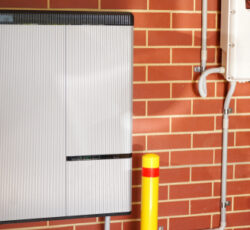 When considering the installation of solar panels, it’s important to also consider the size of the solar battery that will accompany them. Solar batteries store the excess energy generated by solar panels during the day for use during nighttime or when there is limited sunlight. Choosing the right size solar battery is crucial to ensure a reliable and efficient energy storage system. In this blog post, we will discuss factors to consider when determining the size of the solar battery needed for your solar panels.
When considering the installation of solar panels, it’s important to also consider the size of the solar battery that will accompany them. Solar batteries store the excess energy generated by solar panels during the day for use during nighttime or when there is limited sunlight. Choosing the right size solar battery is crucial to ensure a reliable and efficient energy storage system. In this blog post, we will discuss factors to consider when determining the size of the solar battery needed for your solar panels.
1. Energy Usage
The first factor to consider when determining the size of the solar battery is your energy usage. Start by assessing your household’s average daily energy consumption in kilowatt-hours (kWh). This can be obtained from your electricity bills or by using energy monitoring devices. Understanding your energy usage will help you determine how much energy you need to store in the solar battery to power your home when the sun is not shining.
2. Peak Demand
In addition to your average energy usage, it’s important to consider your peak energy demand. Peak demand refers to the maximum amount of power your home requires at any given time. This is particularly important if you have high-powered appliances or if your home experiences spikes in energy demand. Taking into account your peak demand will help you choose a solar battery that can handle the necessary power output during periods of high energy usage.
3. Sunlight Hours
The amount of sunlight hours your location receives is another crucial factor in determining the size of your solar battery. Areas with longer days and more intense sunlight will generate more energy from solar panels, allowing for a smaller battery size. Conversely, areas with shorter days or less sunlight intensity will require a larger battery to store sufficient energy for prolonged periods of no sunlight.
4. Battery Capacity
The capacity of a solar battery refers to its ability to store energy, typically measured in kilowatt-hours (kWh). A higher battery capacity means it can store more energy and provide longer periods of backup power. To determine the battery capacity you need, consider the length of time you anticipate using stored energy during the night or in case of power outages. For example, if you want your solar battery to power your home for 12 hours during the night, and your average nighttime energy usage is 10 kWh, you would need a battery capacity of at least 120 kWh.
5. Depth of Discharge
The depth of discharge (DoD) is another important consideration when sizing a solar battery. The DoD refers to the percentage of battery capacity that can be safely used without causing damage or significantly reducing the battery’s lifespan. Different battery chemistries have different recommended DoD levels. For example, lithium-ion batteries typically have a higher DoD compared to lead-acid batteries. It’s important to choose a battery with an appropriate DoD to ensure optimal performance and longevity.
6. Battery Efficiency and Lifespan
Consider the efficiency and lifespan of the solar battery when determining its size. Battery efficiency refers to how well the battery can convert stored energy into usable electricity. Higher efficiency batteries will provide more usable energy for your home. Additionally, consider the lifespan of the battery, as it will affect its overall cost-effectiveness. Longer-lasting batteries may require a higher upfront investment but can save you money in the long run by delaying the need for battery replacement.
7. Budget
Lastly, consider your budget when determining the size of your solar battery. Larger batteries with higher capacities tend to be more expensive. Assess your financial capabilities and find a balance between your energy storage needs and available budget. It may be advisable to consult with solar energy professionals who can provide guidance and help you find the best fit for your requirements and budget.
Summary
Choosing the right size solar battery is crucial to ensure the efficient and reliable storage of energy generated by your solar panels. Factors such as energy usage, peak demand, sunlight hours, battery capacity, depth of discharge, battery efficiency, lifespan, and budget all play a role in determining the appropriate battery size. Careful consideration of these factors, combined with professional advice, will help you find the optimal solar battery solution for your specific needs and maximize the benefits of your solar energy system.
Need a Solar Company in Lake Havasu City, AZ?
Mohave Solar is a complete solar design and installation company. From swimming pool solar and solar power for your house to advanced battery storage systems, we can design a system to suit your needs. We are locally owned and operated from Lake Havasu City, Arizona. We cover all of Mohave and La Paz County. Our design and installation team has over thirty years of experience and we have thousands of satisfied customers. We take pride in our work and are licensed, bonded and insured. Contact us today to learn more about what we can do for you!
